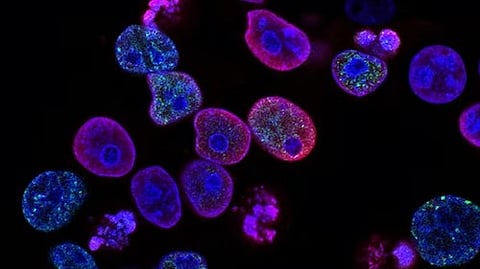Genetic Variant Associated With Earlier Onset Childhood Epilepsy
Researchers at Children’s Hospital of Philadelphia (CHOP) have discovered a specific genetic variant in SCN1A, the most common genetic epilepsy, that leads to an earlier onset of epilepsy, with clinical features distinct from other epilepsies. The researchers also identified a potentially effective treatment strategy. The findings were recently published in the journal Epilepsia.
Most genetic variants in SCN1A are associated with Dravet syndrome. Dravet syndrome is a form of genetic epilepsy that is characterized by seizures that begin in the first year of life, along with differences in childhood development and features of autism spectrum disorder. In these cases, there is a loss-of-function variant of SCN1A, meaning that the resulting protein is not able to carry out its normal functions. However, this study focused on a gain-of-function variant of SCN1A, which means the resulting protein carries out additional functions in ways that may be harmful.
“This genetic change does exactly the opposite of what it should do, which in turn causes a peculiar clinical presentation,” said senior study author Ingo Helbig, MD, a pediatric neurologist in the Division of Neurology and co-director of the Epilepsy Neurogenetics Initiative (ENGIN) at CHOP. “A better understanding of what this variant does is critical for us to determine which treatments to choose for affected patients.”
In this study, researchers used diagnostic testing to identify four patients with an identical gain-of-function variant in SCN1A. All four patients had an early-onset developmental and epileptic encephalopathy (DEE), which is characterized by a combination of seizures and developmental delays. In these specific cases, patients experienced focal tonic seizures, which are seizures that cause stiffening of the body in one specific area, and additional seizure types starting in the first few weeks of life. The study also found that patients with this recurrent gain-of-function variant in SCN1A-related epilepsies had earlier onset of their disease compared with patients with loss-of-function variants.
Additionally, the study found that oxcarbazepine, a seizure control medication for children and adults, may help patients. One of the patients responded to treatment with the medication, and the variant exhibited sensitivity to the drug.
“Our findings may provide an explanation for why we had previously diagnosed some patients as having atypical Dravet Syndrome, as the earlier onset of symptoms associated with this gain-of-function variant allow us to properly distinguish these cases,” said the study’s first author Jérôme Clatot, PhD, director of the ENGIN Ion Channel/Electrophysiology Core at CHOP. “We hope to raise awareness of this and other potential gain-of-function variants, particularly if common anti-seizure medications may be able to help them.” (AK/NW)


